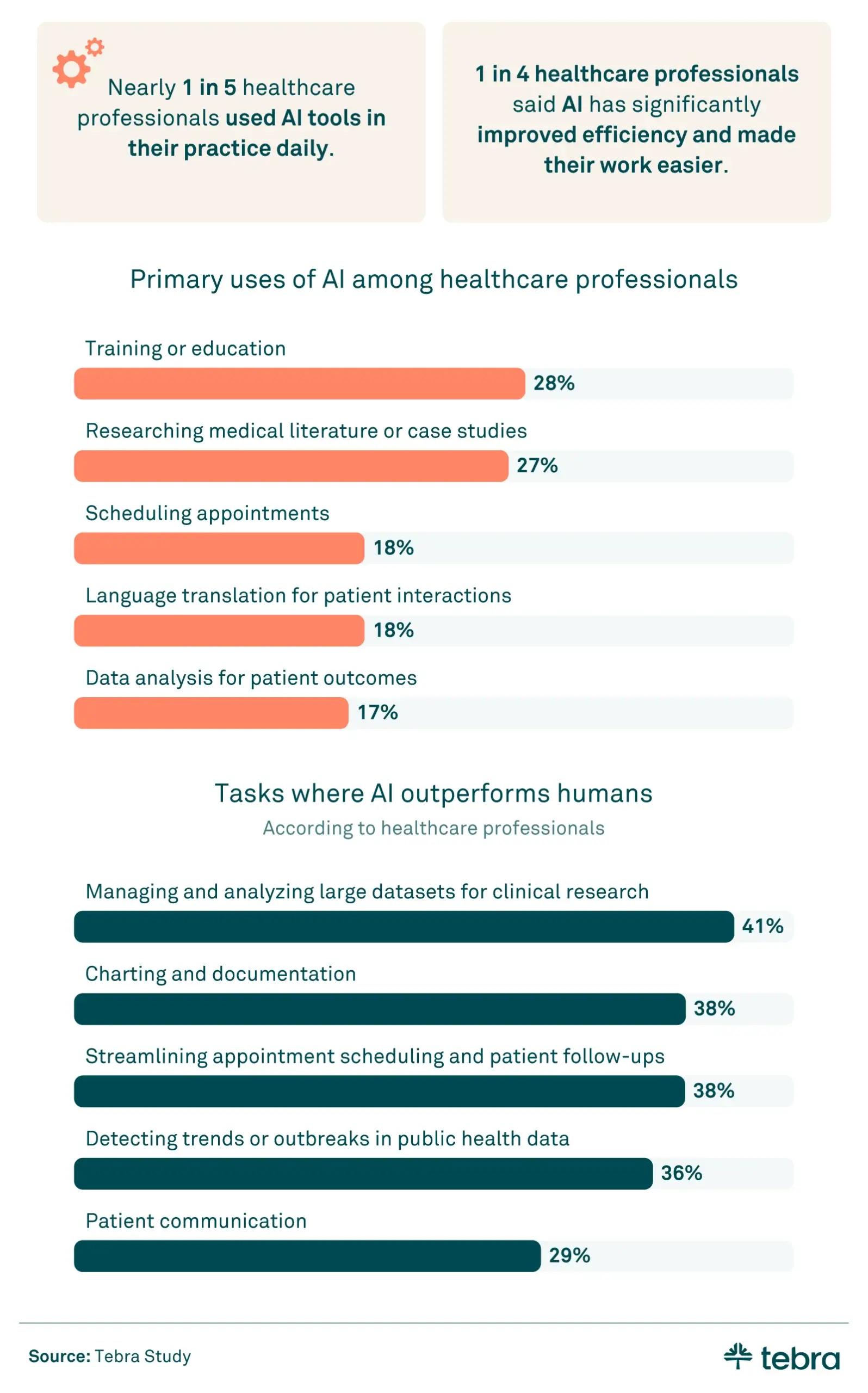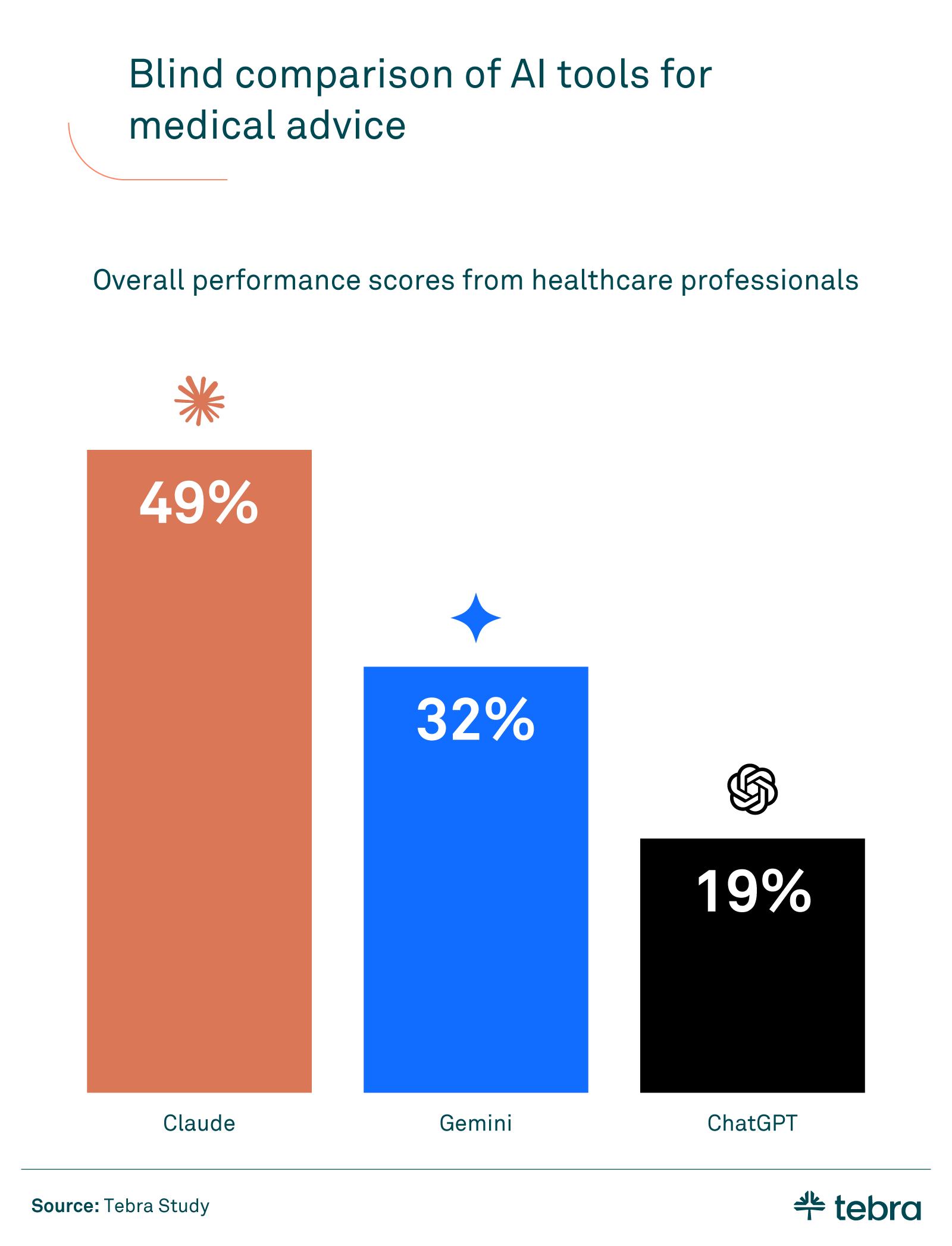Overview
- 3 in 5 Americans have used an AI platform like ChatGPT, Gemini, or Claude for health advice.
- 1 in 4 Americans have acted on AI health advice without consulting a doctor.
- Nearly 1 in 4 healthcare professionals report that AI has given patients advice that contradicts their own.
- When AI’s advice conflicts with the guidance provided by healthcare professionals, 17% of Americans follow AI.
- Claude is the top AI tool for health advice, according to 49% of healthcare professionals.
- In a blind comparison of AI-provided medical advice, Claude leads with the highest average scores in key metrics — 81% in both accuracy and usability, 78% in adherence to standards, and 66% in sensitivity.
How often do you trust technology with your health? Tebra surveyed 800 American patients and 200 healthcare professionals to uncover how AI platforms are changing the way we approach healthcare. From patients seeking quick advice to professionals navigating new tools, the study reveals how AI is reshaping health decisions and care delivery. It also highlights the challenges and opportunities for healthcare professionals — especially those in independent clinics — as they adapt to evolving patient expectations and integrate AI into their practices.
Americans' use of AI for health advice
The growing reliance on artificial intelligence for health-related advice is transforming how Americans approach their medical concerns. Learn how different demographics use AI tools and the implications of these behaviors for healthcare professionals — particularly independent medical practices striving to increase trust and engagement with their patients.

AI platforms like ChatGPT, Gemini, and Claude have become go-to resources for health advice, with 3 in 5 American patients reporting that they have turned to these tools. Among Gen Zers, this figure jumped to 3 in 4.
Americans have most often asked AI for health advice for the following purposes:
- Researching specific medical conditions (47%)
- Diagnosing symptoms (43%)
- Exploring prevention strategies (42%)
- Seeking mental health support or advice (31%)
- Researching medication side effects (29%)
However, this reliance on AI doesn't come without risks: 1 in 4 Americans reported acting on AI health advice without consulting a doctor. This issue was even more concerning among Gen Z, with 30% skipping professional consultation entirely. Another 1 in 10 Americans delayed or skipped a doctor's visit altogether following an AI consultation, with Gen Z again leading at 16%.
These findings highlight the crucial role of independent clinics in providing personalized guidance and ensuring patients receive accurate and comprehensive information, helping to bridge the gap between AI-driven advice and professional medical care. Practices can leverage technology, such as electronic health record (EHR) software, to enhance patient engagement and address the information patients receive from AI platforms.
AI tools are not only influencing patient actions but also reshaping their attitudes. Over half of Americans (56%) felt more informed about their health options after using AI, and 1 in 4 felt empowered to take action. While 20% of Americans felt motivated to seek professional care after using AI, 17% followed AI advice when it conflicted with their healthcare provider's guidance.
Despite these challenges, AI has a unique role in encouraging deeper inquiry. Over half of Americans (54%) were more likely to conduct additional research when using AI tools compared to when searching via Google.
These trends present both challenges and opportunities for small independent practices. Patients' increasing reliance on AI for initial health advice shows a need for these practices to emphasize their expertise and build trust. Addressing the information patients receive from AI platforms can help practitioners position themselves as indispensable resources for accurate, personalized care.
Healthcare professionals and the integration of AI tools
As healthcare technology advances rapidly, professionals are navigating AI's benefits, challenges, and the evolving expectations of their roles.

Nearly 1 in 5 healthcare professionals reported using AI tools in their practice daily, and 1 in 4 said these tools have significantly improved efficiency and made their work easier. For small practices, which often operate with limited resources, AI offers the potential to streamline workflows and enhance patient care, provided proper training is made accessible. Integrating AI tools with EHR systems allows independent practices to optimize operations, boost productivity, and deliver more personalized care.
However, the integration of AI into healthcare currently remains uneven, with 70% of professionals stating they have not received adequate training to use AI tools effectively. Beyond accuracy and clarity, healthcare professionals should also consider whether an AI platform is HIPAA compliant to ensure the privacy and security of patient information. Despite this gap, 2 in 5 healthcare professionals believed AI tools are delivering on expectations in key areas such as improving diagnostic accuracy, enhancing efficiency, personalizing treatments, and supporting medical decisions.
AI's presence in patient interactions is also notable. Nearly 1 in 4 healthcare professionals reported that patients referenced AI tools during consultations, and in similar numbers, they observed AI advice contradicting their own. In such cases, over 90% of patients chose to follow the healthcare professional's guidance. However, 13% of healthcare professionals noted that patients have delayed seeking care due to reliance on AI-generated advice.
The rise of AI has sparked both optimism and concern among healthcare professionals. While 1 in 2 believed AI could replace aspects of their role within the next decade, they also expressed these top concerns:
- Accuracy of AI diagnoses (41%)
- Lack of human empathy and personal touch (39%)
- Over-reliance on AI by professionals (38%)
- Ethical issues (38%)
- Privacy and data security (36%)
As AI use in healthcare increases, addressing these issues will be crucial for its effective and ethical use. For small independent practices, focusing on the human connection and addressing patient misconceptions about AI can strengthen trust and ensure AI complements rather than complicates their work. By streamlining administrative tasks, AI tools can also reduce the burden on staff, freeing up more time for personalized patient interaction and care — a critical advantage for practices striving to build stronger patient relationships.
Healthcare professionals evaluate AI's advice
To assess how well AI tools perform when asked to provide medical advice, Tebra conducted a blind comparison of outputs from three leading platforms: Claude, Gemini, and ChatGPT. Healthcare professionals evaluated each platform's responses to medical scenarios, scoring them based on accuracy, adherence to standards, clarity, sensitivity, and usability.

Claude emerged as the top choice, with healthcare professionals selecting it 49% of the time. It achieved the highest average scores in several critical categories, including 81% in both accuracy and usability and 78% in adherence to medical standards. While these metrics highlight Claude's reliability and practicality, its sensitivity score of 66% suggests room for improvement in addressing emotionally charged or delicate patient concerns.

Gemini, on the other hand, outperformed its competitors in clarity, scoring an impressive 79%. Despite this edge in clear communication, it lagged behind Claude in all other metrics. Gemini ended up with a total overall score of 32%, while ChatGPT scored the lowest (19%).
Explore the medical scenario comparisons below to see how each AI handled real-world healthcare questions and how healthcare professionals rated them.






These results show that each AI platform brings something different to the table, with room for improvement across the board.
The evolving role of AI in healthcare
AI is undeniably changing healthcare, offering new ways for patients and professionals to access and deliver care. The findings from Tebra's study highlight both the benefits and challenges of this technology. AI offers empowerment and accessibility for patients, but professional guidance remains essential to making informed health decisions. As healthcare professionals and practices continue to adapt, balancing AI's strengths with human expertise will be key to improving care for everyone.
Methodology
Tebra conducted a survey of 800 American patients and 200 healthcare professionals to examine the evolving role of AI in healthcare. Among patients, the average age was 41, with an even gender distribution (50% women, 50% men). Generationally, respondents included 9% Baby Boomers, 20% Gen X, 52% Millennials, and 19% Gen Z. Healthcare professionals had an average age of 38, with 67% identifying as women and 32% as men.
Additionally, a blind comparison methodology was used to evaluate the performance of three AI tools — GPT, Gemini, and Claude — across six medical and wellness scenarios. Each tool was provided with identical prompts derived from real-world health inquiries. Healthcare professionals anonymously rated the AI-generated responses based on predefined criteria: accuracy, clarity, usability, adherence to clinical standards, and sensitivity. This approach ensured an unbiased and comprehensive assessment of each tool's effectiveness in providing reliable and practical health-related guidance.
About Tebra
Tebra, headquartered in Southern California, empowers independent healthcare practices with cutting-edge AI and automation to drive growth, streamline care, and boost efficiency. Our all-in-one EHR and billing platform delivers everything you need to attract and engage your patients, including online scheduling, reputation management, and digital communications.
Inspired by "vertebrae," our name embodies our mission to be the backbone of healthcare success. With over 165,000 providers and 190 million patient records, Tebra is redefining healthcare through innovation and a commitment to customer success. We're not just optimizing operations — we're ensuring independent practices thrive.
Fair use statement
You may share this article with your audience for noncommercial purposes. Just remember to link back to this page so others can explore the full study and insights.






